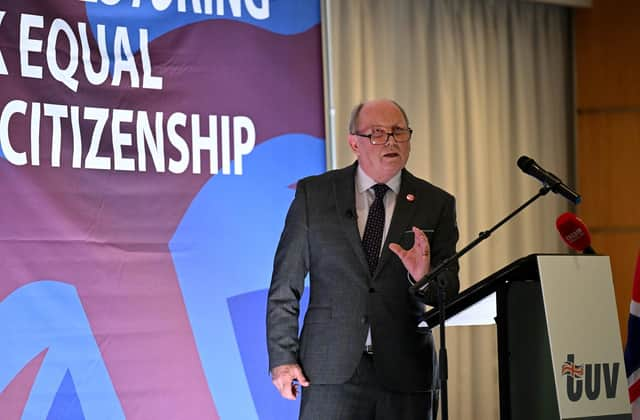Wreckers, splitters and sell-outs - echoes of 2001 as deal once more divides unionism


Fast forward 23 years and the DUP – dominant for almost a quarter of a century – are facing their own challenge from a party almost as uncompromising as they were with the Ulster Unionists.
As things stand, Jim Allister’s party aren’t poised to replace the DUP at the top of the unionist tree any time soon – but they are ready to take them on, come what may.
Advertisement
Hide AdAdvertisement
Hide AdYesterday, the TUV leader told the BBC “there are no DUP seats, there are no Sinn Fein seats – they are the people’s seats” as he vowed to challenge all “protocol implementers” at the general election – including anti-deal DUP MPs.
The DUP MP Gregory Campbell said the TUV were taking a “wrecking ball” approach to unionist politics. He said: “Their wrecking and splitting approach will be music to the ears of those who want to see fewer Unionist MPs elected to Westminster.
“This approach to ‘strengthening the Union’ from the TUV is to weaken and divide unionism and in effect do the job of those who want to ensure a weaker and divided unionism is delivered”.
Mr Allister is unbending in his opposition to any manifestation of the Irish Sea border – and he argues that most ordinary unionists are too.
Advertisement
Hide AdAdvertisement
Hide AdBack in 2001, Mr Campbell said of his decision to run against a fellow anti-Belfast agreement unionist, the UUP’s Willie Ross: "There is now in place a system of Government to which the majority of unionists take exception. Since the Belfast Agreement has been signed there has been a majority of UUP MPs at Westminster who are opposed to its implementation”. Mr Campbell won the seat, saying of his victory: “There is a God in heaven”.
The reasoning by the DUP over twenty years ago to run against even anti-agreement Ulster Unionists was that the political arrangements were so intolerable there had to be change.
Today, Jim Allister feels he is in the same position. He said the TUV – Reform UK alliance is “affording unionists the opportunity to reject the protocol. To reject an Irish Sea border. To reject being governed by foreign laws we don’t make, we can’t change. And to reassert our demand that our place is fully restored within the United Kingdom”.
The DUP don’t see it that way. They say their deal has restored Northern Ireland’s place in UK and some even argue it has removed the Irish Sea border.
Advertisement
Hide AdAdvertisement
Hide AdDUP MLA Phillip Brett responded to Mr Allister, saying: “Unionism as a whole across NI wants to see representation maximised – I think that’s where the vast majority of unionists are at. It’s just a great pity that Jim Allister’s focus seems to be on attacking fellow unionists rather than supporting that goal of maximising our representation across Northern Ireland”.
A few hours later his DUP colleague Gregory Campbell was on the attack himself – criticising the TUV – Reform UK pact. “Unionists across Northern Ireland are wiser to the nonsense being talked by some who themselves not so long ago voted for the Protocol in the European Parliament”, he said.
The TUV Causeway councillor Allister Kyle – a likely candidate to challenge Mr Campbell in East Londonderry – said “Gregory Campbell, who won his Westminster seat from a Unionist who resolutely took a stand against the Belfast Agreement only to become a cheerleader for terrorist inclusive government a short time later, is in no position to talk about ‘wrecking’ Unionism”.
He added: “As for his snide comments about how people have voted in relation to EU law, Unionists need only look at how his DUP colleagues in the Assembly backed a ban on British soil not so long ago to see how seriously such remarks should be taken.”
Advertisement
Hide AdAdvertisement
Hide AdThe 2024 election is different from 2001 for many reasons – not least because unionism is in a much weaker position. Many in the TUV appreciate they’re unlikely to beat the DUP – but they do want to punish them at the ballot box – even if that means non-unionist parties taking the seats.
The starting gun has been fired on the election race, and the unionist electorate must once again decide if they stick with the biggest party and ‘bank the gains’ they achieved – or take exception to the deal at the ballot box.
Comment Guidelines
National World encourages reader discussion on our stories. User feedback, insights and back-and-forth exchanges add a rich layer of context to reporting. Please review our Community Guidelines before commenting.